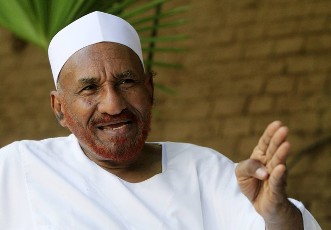Opposition leader warns of growing polarization in Sudan
October 14, 2012 (KHARTOUM) – The leader of Sudan’s opposition National Umma Party (NUP), Al-Sadiq al-Mahdi, warned on Sunday that the country is growing increasingly polarized in terms of core political issues and ways of pursuing change.

In the first category, he cited the example of the Islamic Constitution Front (ICF), a coalition of Islamist groups and individuals who threatened to rise against the government if it does not create a puritan version of an Islamic constitution to replace the country’s current interim constitution.
On the other side, Al-Mahdi added, there is the Sudanese Revolutionary Front (SRF), an alliance of rebel groups seeking regime change and what Al-Mahdi described as the establishment of a secular state in the country.
Al-Mahdi said that his party was offering a way out of the crisis by proposing the organization of a round-table conference bringing together all political forces to achieve stability and avert the option of violence.
“This is what we wager on and we believe it’s the best option to resolve all issues in a preemptive manner” he added.
The NUP leader is often accused by other opposition groups of having a vague position on the issue of regime change. He alienated his party’s allies in the coalition National Consensus Forces (NCF) on more than one occasion by swimming against their current of regime change via popular uprising, as well as by advocating ideas of change from within the ruling National Congress Party (NCP).
In his address, Al-Mahdi claimed that many within the NCP are dissatisfied with the current situation and looking for change.
Al-Mahdi also attributed the state of polarization to the cycle of military coups which, in his words, “create an artificial and temporary stability with harmful results”.
The veteran opposition figure took the opportunity to call on the Islamists who rose to power in Tunisia and Egypt following popular revolts against long-serving authoritarian regimes in 2010 to take a warning from the experience of their fellow Islamists in Sudan.
He blamed the Islamist slogans that the NCP has been raising for the breakup of the country with the secession of South Sudan in July last year.
According to Al-Mahdi, the NCP is directly responsible for the secession because of its exclusionist rhetoric in a society with a great deal of ethnic and cultural diversity.
(ST)
